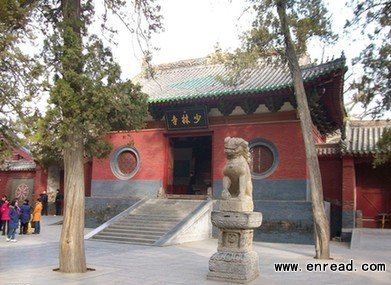| ||||||||||||||||||||||||||||||||||||||||||||||||||||||||||||||||||||||||||||||||||||||||||||||||||||||||||||||||||||||||||||||||
|
全国人大代表、少林寺方丈释永信表示,时机成熟的时候,少林寺会考虑在海外开办分支机构。  shaolin temple shi yongxin, abbot of the shaolin temple, said at least 1,000 overseas visitors stay at the temple every year in central china's henan province to practice 3 and chinese kung fu, and the number has been increasing. another 200,000 4 come from abroad to the temple 5 for sightseeing, and groups of foreign 6 are commonly seen, said shi, who is also a deputy to the national people's congress. "the number is very impressive, considering that shaolin temple is located far from cities and visitors have to make a special trip." shi also said the temple's traditional buddhist lifestyle and its palaces, which have been restored over the past three decades, contribute to its popularity. master xue cheng, vice-chairman of the china buddhism association, said the rational and 7 thinking of buddhism has much in common with western civilization and can be an effective medium for dialogue between the east and the west. he said the world buddhism 8, held in jiangsu and taiwan in recent years, has promoted chinese buddhism studies worldwide and also has improved communication with other countries. the centuries-old temple, however, came under a shadow this year when a national watchdog for tourist attractions warned that it may lose its top rating if it fails to improve its service and maintenance(维护,保持) by the end of march. the 9 site had 61,000 visitors during the seven-day chinese new year holiday, and ticket revenues had fallen 13.7 percent year-on-year, henan-based dahe daily reported. the abbot conceded(承认,退让) that tourism has to some extent 10 buddhist practices, but he added that religious activities are always the focal point(焦点) of the temple and tourism comes second. "but to simply shut the temple down can only arouse more 11. what we need to do is to continue improving the service," he said, adding that the ticket revenues are used to feed the 12 in residence. xue also conceded that buddhist activities in china need guidance and clearer regulation. previous media reports revealed that many temples are now leased to individuals or companies, and have become tools for making money. "i have read some of the articles, and i agree that they are telling the truth. the problem of temples becoming commercialized and imposters(骗子) using buddhism to cheat people has become more serious in recent years," xue said. the problem is rooted in the unclear division of responsibilities, he said. shi, while echoing xue, said many temples, especially in central and western china, are not open to the public but under the management of local governments. temples in china are usually under several government organs, including bureaus of religious affairs, tourism or gardening, making no single agency 13 in charge of the management and 14. in some places, companies would build temples and then invite monks to set up a 15. the temple then would return "profits" to the companies to cover their investment and provide revenue. "a temple should be a pure place for worship, not a 16(赚钱的) property," xue said. 点击  收听单词发音 收听单词发音
|
||||||||||||||||||||||||||||||||||||||||||||||||||||||||||||||||||||||||||||||||||||||||||||||||||||||||||||||||||||||||||||||||
上一篇:雷锋精神出版物强力发行 下一篇:保障人权入法刑事诉讼法修正案草案 |
||||||||||||||||||||||||||||||||||||||||||||||||||||||||||||||||||||||||||||||||||||||||||||||||||||||||||||||||||||||||||||||||
- 发表评论
-
- 最新评论 进入详细评论页>>

